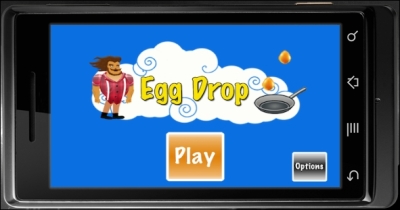We will create the frontend of our game by introducing the game title and the Play and Options buttons that will transition throughout different scenes in the application with ease.
- Create a new file called
mainmenu.luaand import Composer and the UI modules, thecomposer.newScene()function, and the variables for timer and audio:local composer = require( "composer" ) local scene = Composer.newScene() local ui = require("ui") local btnAnim local btnSound = audio.loadSound( "btnSound.wav" ) - Create the
create()event. Add in thecomposer.removeScene( "maingame" )andcomposer.removeScene( "options" )lines, which will remove the"maingame"and"options"scenes. You can remove"maingame"after the player has transitioned from the main game screen and is sent to the main menu screen. You can remove"options"after the player has transitioned from the options screen and is sent to the main menu screen:-- Called when the scene's view does not exist: function scene:create( event ) local sceneGroup = self.view -- completely remove maingame and options composer.removeScene( "maingame" ) composer.removeScene( "options" ) print( "\nmainmenu: create event" ) end
- Add in the
show()event and thebackgroundImagedisplay object;-- Called immediately after scene has moved onscreen: function scene:show( event ) local sceneGroup = self.view print( "mainmenu: show event" ) local backgroundImage = display.newImageRect( "mainMenuBG.png", 480, 320 ) backgroundImage.x = 240; backgroundImage.y = 160 sceneGroup:insert( backgroundImage )
- Introduce the
playBtndisplay object and create a function calledonPlayTouch(event)that usescomposer.gotoScene()to change the scene to"loadgame". Use the"fade"effect to change scenes:local playBtn local onPlayTouch = function( event ) if event.phase == "release" then audio.play( btnSound ) composer.gotoScene( "loadgame", "fade", 300 ) end end playBtn = ui.newButton{ defaultSrc = "playbtn.png", defaultX = 100, defaultY = 100, overSrc = "playbtn-over.png", overX = 100, overY = 100, onEvent = onPlayTouch, id = "PlayButton", text = "", font = "Helvetica", textColor = { 255, 255, 255, 255 }, size = 16, emboss = false } playBtn.x = 240; playBtn.y = 440 sceneGroup:insert( playBtn ) - Transition the
playBtndisplay object to y = 260 in 500 milliseconds using theeasing.inOutExpotransition. Have it initialized throughbtnAnim:btnAnim = transition.to( playBtn, { time=1000, y=260, transition=easing.inOutExpo } ) - Introduce the
optBtndisplay object and create a function calledonOptionsTouch(event). Usecomposer.gotoScene()to transition the scene to"options"using the"crossFade"effect:local optBtn local onOptionsTouch = function( event ) if event.phase == "release" then audio.play( btnSound ) composer.gotoScene( "options", "crossFade", 300) end end optBtn = ui.newButton{ defaultSrc = "optbtn.png", defaultX = 60, defaultY = 60, overSrc = "optbtn-over.png", overX = 60, overY = 60, onEvent = onOptionsTouch, id = "OptionsButton", text = "", font = "Helvetica", textColor = { 255, 255, 255, 255 }, size = 16, emboss = false } optBtn.x = 430; optBtn.y = 440 sceneGroup:insert( optBtn ) - Transition the
optBtndisplay object toy = 280in 500 milliseconds using theeasing.inOutExpotransition. Have it initialized throughbtnAnim. Close thescene:show( event )function withend:btnAnim = transition.to( optBtn, { time=1000, y=280, transition=easing.inOutExpo } ) end - Create the
hide()event and cancel thebtnAnimtransition. Also, create thedestroy()event:-- Called when scene is about to move offscreen: function scene:hide() if btnAnim then transition.cancel( btnAnim ); end print( "mainmenu: hide event" ) end -- Called prior to the removal of scene's "view" (display group) function scene:destroy( event ) print( "destroying mainmenu's view" ) end
- Add the event listeners for all the scene events and for
return scene. Save and close your file:-- "create" event is dispatched if scene's view does not exist scene:addEventListener( "create", scene ) -- "show" event is dispatched whenever scene transition has finished scene:addEventListener( "show", scene ) -- "hide" event is dispatched before next scene's transition begins scene:addEventListener( "hide", scene ) -- "destroy" event is dispatched before view is unloaded, which can be scene:addEventListener( "destroy", scene ) return scene

On the main menu screen, we added an image that displayed the game title and the Play and Options buttons. The Options button is still not functional at this time. The onPlayTouch() function transitions the scene to "loadgame". This will change scenes to loadgame.lua. The Play button is placed at x = 240; y = 440, (middle and offscreen). When the scene loads, playBtn transitions to y = 260, so it pops up from the bottom of the screen in 1000 milliseconds.
The Options button does a similar thing. The optBtn object is placed to the right of the stage and pops up at y = 280 in 500 milliseconds.
The btnAnim transition is cancelled by transition.cancel( btnAnim ) through the scene:hide() function. It is important to clean timers, transitions, and event listeners every time you change scenes so that potential memory leaks do not occur while in the application.